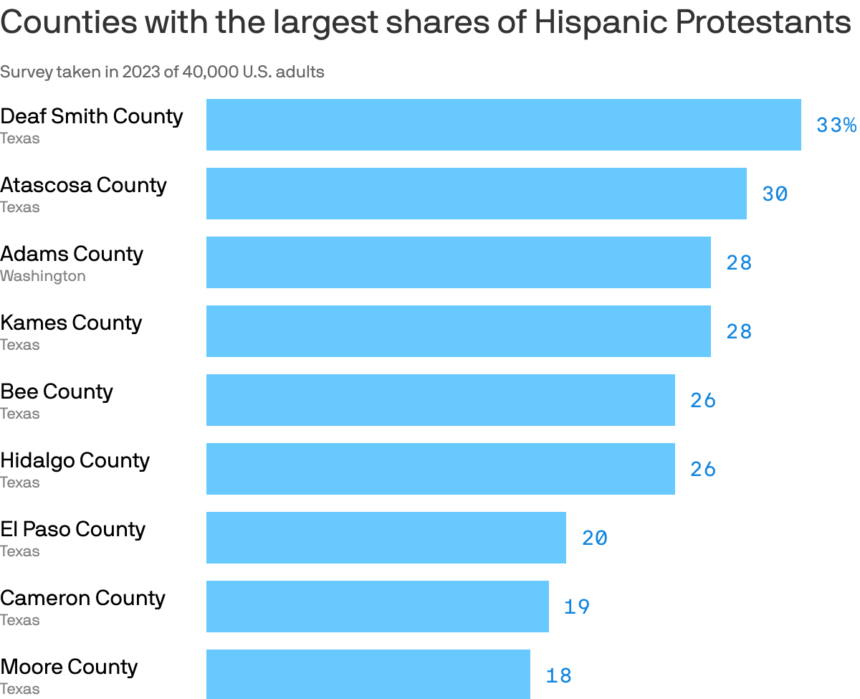Latino Protestants are more politically diverse than conservative-leaning white evangelicals, according to a new report.
Why it matters: The growing number of Latino Protestants, who are predominantly evangelical, are making elections hard to predict as the latest data show they differ politically from white and Black Christians.
The big picture: Latino Protestants now comprise around 4% of the U.S. population and are concentrated in the Southwest and West, particularly in states that share a border with Mexico, the data from the nonpartisan Public Religion Research Institute shows.
- Their presence is especially strong in Texas, where they are now 8% of the state’s population. The percentage of Hispanic evangelicals in Texas has grown by nearly 30% since 2013.
- They have made races in once Democratic-strong South Texas more competitive.
By the numbers: Hispanic Protestants are divided politically, with 30% identifying as independents, 27% identifying as Republicans, and 25% identifying as Democrats in 2023.
- Meanwhile, Black Protestants, who make up 8% of the U.S. population, overwhelmingly identify as Democrats (65%), while 22% identify as independents, and just 5% identify as Republicans.
- White evangelical Protestants overwhelmingly identify as Republicans (61%), with fewer than one-quarter identifying as independents (23%) and less than one in ten identifying as Democrats (9%).
- A plurality of white mainline (non-evangelical) Protestants identify as Republicans (40%), while 31% identify as independents, and 23% identify as Democrats.
Yes, but: Hispanic Catholics make up 8% of the U.S. population (the same as in 2013).
- 43% of Hispanic Catholics identify as Democrats, while 30% identify as independents and 15% identify as Republicans.
The intrigue: Latinos who identify as “religiously unaffiliated” are roughly 4% of the U.S. population — a percentage that is steadily increasing among all Americans since 2013, the census found.
- Overall, 27% of all Americans now consider themselves religiously unaffiliated, up from 21% a decade ago.
What they’re saying: The shift of Latinos from Catholicism to Protestantism or religiously unaffiliated is part of their “Americanization,” PRRI founder and president Robert P. Jones tells Axios.
- “In these more rural areas, there are more white Protestants who have an influence.”
Between the lines: In general, evangelical Protestants are more loosely organized and lean more conservative than many mainline Protestants, who have a defined hierarchy and tend to be more progressive.
- Samuel Rodriguez, a Latino evangelical leader and the author of the upcoming book, “Fresh Oil, Holy Fire, New Wine: Living the Vibrant Holy Spirit-Filled Life,” tells Axios that some Latinos are leaving the Catholic church because of its bureaucracy and strict requirements.
- Rodriguez says he believes that’s also why we’re seeing more religiously unaffiliated Latinos.
- “I don’t blame them. I really don’t. So, am I alarmed? Not necessarily, because somehow they’re still finding (their) way over to God.”
Methodology: The 2023 American Values Atlas is based on a random sample of 40,000 adults (age 18 and up) living in all 50 states, plus the District of Columbia, who provided their religious affiliation between Jan. 1, 2023, and Dec. 31, 2023.
- They are part of Ipsos’ KnowledgePanel®.
- The margin of sampling error is ±0.7 percentage points at the 95% confidence level, for results based on the entire sample.
Subscribe to Axios Latino to get vital news about Latinos and Latin America, delivered to your inbox on Tuesdays and Thursdays.











